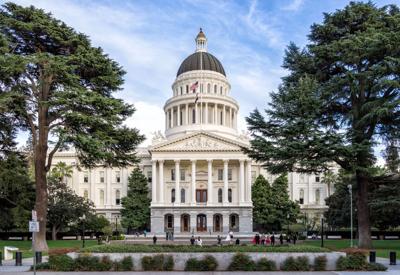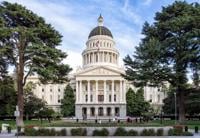
California State Capitol in Sacramento (Andre m / Wikimedia Commons)
This story was originally published by EdSource. Sign up for their daily newsletter.
California lawmakers are racing to finish a deal on two competing bills aimed at cracking down on charter school fraud — a debate that could significantly strengthen oversight of more than 1,200 schools and billions in taxpayer funding.
After weeks of negotiations, Assembly Bill 84, by Assemblymember Al Muratsuchi, D-Torrance, and Senate Bill 414, from Sen. Angelique Ashby, D-Sacramento, cleared the suspense file for pending bills, narrowly making the deadline for bills to advance to the floor this session. But they are far from home free.
Behind closed doors, talks stretched through the Labor Day weekend as lawmakers, education officials, charter advocates and labor unions grappled with the remaining unresolved differences.
People familiar with the discussions described them as “professional” and said the parties are negotiating “in good faith.” By Monday afternoon, they reported that, despite progress, frustration was also mounting as negotiators focused on the most divisive issues.
Those issues still in play include some of the new auditing requirements, funding formulas and proposed limits on the size of nonclassroom-based charter schools that smaller districts can authorize.
Nonclassroom-based schools — a broad category that includes virtual programs, homeschooling and hybrid models — have been at the center of several high-profile fraud cases in California. AB 84 would prohibit districts with fewer than 10,000 students from authorizing a nonclassroom-based charter that enrolls more than twice the number of students in the district’s own schools.
Supporters argue the change is necessary to prevent a repeat of past scandals, but charter leaders say the focus on district size alone is misplaced.
“In some of these fraud cases, the size of the authorizer may have had an impact,” acknowledged Kristin Armatis, director of the charter school office at the San Diego County Office of Education. But, she added, the larger issue is the lack of strong oversight practices by an authorizer of any size. “If there is something going on, hopefully you would catch it very early if you have best practices and strong oversight in place.”
The deadline for amendments is Sept. 8. If no agreement is reached by then, the bills could face a floor fight or be withdrawn, setting the stage for a new bout when the Legislature reconvenes in January.
Kathryn Baron is a freelance writer.











(0) comments
Welcome to the discussion.
Log In
Keep it Clean. Please avoid obscene, vulgar, lewd, racist or sexually-oriented language.
PLEASE TURN OFF YOUR CAPS LOCK.
Don't Threaten. Threats of harming another person will not be tolerated.
Be Truthful. Don't knowingly lie about anyone or anything.
Be Nice. No racism, sexism or any sort of -ism that is degrading to another person.
Be Proactive. Use the 'Report' link on each comment to let us know of abusive posts.
Share with Us. We'd love to hear eyewitness accounts, the history behind an article.